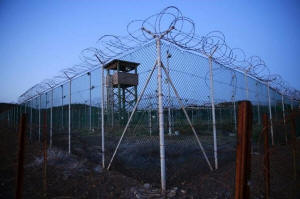|
U.S. transfers four Guantanamo inmates in
waning hours of Obama tenure
 Send a link to a friend
Send a link to a friend
 [January 20, 2017]
By Matt Spetalnick and Idrees Ali [January 20, 2017]
By Matt Spetalnick and Idrees Ali
WASHINGTON (Reuters) - The United States
sent four detainees from the Guantanamo Bay military prison to the
United Arab Emirates and Saudi Arabia on Thursday, marking President
Barack Obama's final prisoner transfers from a facility whose continued
existence he said would be judged harshly by history.
With Republican Donald Trump to be sworn in as president on Friday and
vowing to keep the prison open, Democrat Obama whittled down the inmate
population there to only 41, far short of fulfilling his promise to
close the jail dating back to his 2008 presidential campaign.
In a parting shot on an issue seen tarnishing his legacy, Obama said
U.S. lawmakers who have thwarted his efforts to shut the prison at the
U.S. naval base in Cuba "have abdicated their responsibility to the
American people."
"History will cast a harsh judgment on this aspect of our fight against
terrorism and those of us who fail to bring it to a responsible end," he
said in a letter to the Republican-controlled Congress. "Once again, I
encourage the Congress to close the facility."
Margaret Huang, executive director of Amnesty International USA, said:
"We are extremely concerned that President-elect Trump will make good on
his threat to subject more people to indefinite detention without charge
or trial.”

The offshore prison was opened by Obama's predecessor George W. Bush to
hold terrorism suspects rounded up overseas after the Sept. 11, 2001
attacks. Under Bush, it came to symbolize harsh detention practices that
opened the United States to accusations of torture.
The latest transfers included three detainees sent to the UAE, including
the last Russian held at the prison, and an Afghan and a Yemeni, U.S.
officials said. A Saudi prisoner was sent home. It marked the completion
of Obama's final flurry of releases.
Trump said during the election campaign that he not only wants to keep
the prison open but "load it up with some bad dudes."
Obama pressed ahead, however, moving out most of the prisoners on a list
of low-level detainees deemed by parole-style inter-agency reviews to be
safe for transfer. There were 242 prisoners when he took office.
His efforts were blocked by mostly Republican opposition in Congress,
which barred him from moving prisoners to the U.S. mainland. Pentagon
foot-dragging has also been blamed.
[to top of second column] |

Chain link fence and concertina wire surrounds a deserted guard
tower within Joint Task Force Guantanamo's Camp Delta at the U.S.
Naval Base in Guantanamo Bay, Cuba March 21, 2016. REUTERS/Lucas
Jackson/File Photo

Obama lamented that his opponents had "placed politics above the
ongoing costs to taxpayers, our relationships with our allies and
the threat posed to U.S. national security."
Trump said this month that all those held at Guantanamo should stay.
"These are extremely dangerous people and should not be allowed back
onto the battlefield," he tweeted.
However, the Obama administration has insisted that intelligence
shows only a very small percentage of the prisoners it has released
have returned to militant activities.
Among the three sent to the UAE was Ravil Mingazov, reported to be
an ethnic Tatar and Russian army veteran captured in Pakistan in
2002. Also sent to UAE were Haji Wali Muhammed and Yassim Qasim
Mohammed Ismail Qasim, while Jabran al Qahtani was flown to Saudi
Arabia, the Pentagon said.
Of the prisoners left at Guantanamo, 10 face charges in military
commissions, including people accused of plotting the Sept. 11
attacks. About two dozen have not been charged but have been deemed
too dangerous to release.
A handful of inmates previously cleared for transfer will remain
after the administration was unable to make arrangements in time for
relocation. Lawyers for two of those detainees, an Algerian and a
Moroccan, mounted last-ditch court challenges seeking their
repatriation but the Justice Department objected.
(Reporting by Matt Spetalnick and Idrees Ali; editing by Grant
McCool and James Dalgleish)
[© 2017 Thomson Reuters. All rights
reserved.]
Copyright 2017 Reuters. All rights reserved. This material may not be published,
broadcast, rewritten or redistributed.
 |